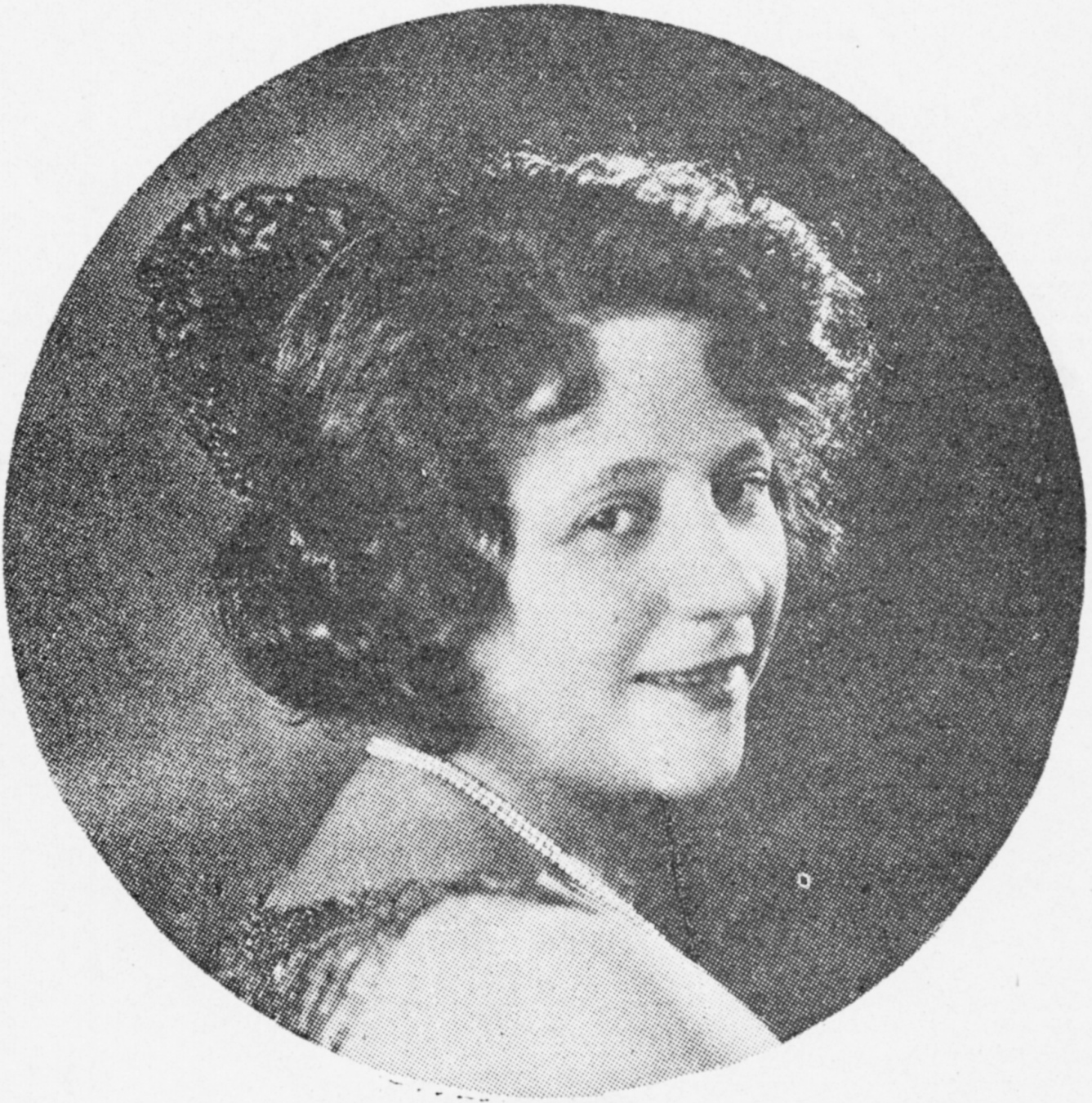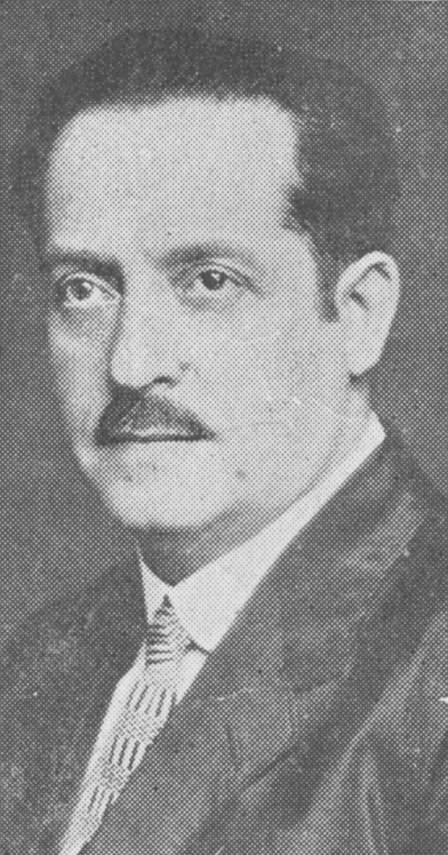|
Zina Goldstein
Zina or Zena Goldstein (5 April 1892 – ) was a Yiddish theater actress and singer. She was born in Minsk, before moving to Warsaw. Her parents, who were also musical, supported her becoming a singer. She joined Aryeh Schlossberg's chorus and was given small roles. She became the prima donna in Abram Yitzhak Zandberg's in Łódź, then worked in Rapel's troupe and for a short time in Kaminsky's. After the outbreak of the first world war, she became the primadonna in Łódź's Scala Theater, run by Julius Adler (b. 1880) and Herman Sierocki, where she played in a number of European operettas.Zylbercweig, Zalmen (1931). Vol. 1, col. 380 New York: Elisheva. In 1920, she immigrated to New York, where she was hired by Boris Thomashevsky to star in . She later co-directed the Liberty Theater with Roland and with Louis Goldberg, whom she married. In 1929–1930 she played at Max Gabel's Public Theater (under the name Zina Goldberg). In 1932, she made her debut at the Rolland Theatre in ... [...More Info...] [...Related Items...] OR: [Wikipedia] [Google] [Baidu] |
Abraham Ellstein
Abraham "Abe" Ellstein (, , July 7, 1907 – March 22, 1963) was an American composer, bandleader and recording artist in the Yiddish theatre and Yiddish popular music milieu. Along with Sholom Secunda, Joseph Rumshinsky, and Alexander Olshanetsky, Ellstein was one of the "big four" composers of his era in New York City's Yiddish Theater District scene. His musical '' Yidl Mitn Fidl'' became one of the greatest hits of Yiddish-language cinema. Life and career He was born on the Lower East Side, Manhattan, at that time an Eastern European Jewish immigrant area. His musical education began at the Third Street Music School Settlement. From the age of nine to thirteen, he studied piano with Frederick Jacobi. He was the conductor of the boy's choir of the Broadway production ''Richard III'', at only thirteen years old. He went on to study at the Graduate School of Juilliard, training as a conductor, with a major in composition. Ellstein's only opera, ''The Golem'', had its world prem ... [...More Info...] [...Related Items...] OR: [Wikipedia] [Google] [Baidu] |
Year Of Death Missing
A year is a unit of time based on how long it takes the Earth to orbit the Sun. In scientific use, the tropical year (approximately 365 solar days, 5 hours, 48 minutes, 45 seconds) and the sidereal year (about 20 minutes longer) are more exact. The modern calendar year, as reckoned according to the Gregorian calendar, approximates the tropical year by using a system of leap years. The term 'year' is also used to indicate other periods of roughly similar duration, such as the lunar year (a roughly 354-day cycle of twelve of the Moon's phasessee lunar calendar), as well as periods loosely associated with the calendar or astronomical year, such as the seasonal year, the fiscal year, the academic year, etc. Due to the Earth's axial tilt, the course of a year sees the passing of the seasons, marked by changes in weather, the hours of daylight, and, consequently, vegetation and soil fertility. In temperate and subpolar regions around the planet, four seasons are ... [...More Info...] [...Related Items...] OR: [Wikipedia] [Google] [Baidu] |
1892 Births
In Samoa, this was the only leap year spanned to 367 days as July 4 repeated. This means that the International Date Line was drawn from the east of the country to go west. Events January * January 1 – Ellis Island begins processing Immigration to the United States, immigrants to the United States. February * February 27 – Rudolf Diesel applies for a patent, on his compression ignition engine (the Diesel engine). * February 29 – St. Petersburg, Florida is incorporated as a town. March * March 1 – Theodoros Deligiannis ends his term as Prime Minister of Greece and Konstantinos Konstantopoulos takes office. * March 6–March 8, 8 – "Exclusive Agreement": Rulers of the Trucial States (Abu Dhabi, Dubai, Sharjah, Ajman, Ras al-Khaimah and Umm al-Quwain) sign an agreement, by which they become ''de facto'' British protectorates. * March 11 – The first basketball game is played in public, between students and faculty at the Springfield YMCA before 200 spectators. The ... [...More Info...] [...Related Items...] OR: [Wikipedia] [Google] [Baidu] |
Polish Cabaret Performers
Polish may refer to: * Anything from or related to Poland, a country in Europe * Polish language * Polish people, people from Poland or of Polish descent * Polish chicken * Polish brothers (Mark Polish and Michael Polish, born 1970), American twin screenwriters * Kevin Polish, an American Paralympian archer Polish may refer to: * Polishing, the process of creating a smooth and shiny surface by rubbing or chemical action ** French polishing, polishing wood to a high gloss finish * Nail polish * Shoe polish * Polish (screenwriting), improving a script in smaller ways than in a rewrite See also * * * Polishchuk (surname) * Polonaise (other) A polonaise ()) is a stately dance of Polish origin or a piece of music for this dance. Polonaise may also refer to: * Polonaises (Chopin), compositions by Frédéric Chopin ** Polonaise in A-flat major, Op. 53 (, ''Heroic Polonaise''; ) * Polon ... {{Disambiguation, surname Language and nationality disambiguation pages ... [...More Info...] [...Related Items...] OR: [Wikipedia] [Google] [Baidu] |
Yiddish Theatre Performers
Yiddish, historically Judeo-German, is a West Germanic language historically spoken by Ashkenazi Jews. It originated in 9th-century Central Europe, and provided the nascent Ashkenazi community with a vernacular based on High German fused with many elements taken from Hebrew (notably Mishnaic) and to some extent Aramaic. Most varieties of Yiddish include elements of Slavic languages and the vocabulary contains traces of Romance languages.Aram Yardumian"A Tale of Two Hypotheses: Genetics and the Ethnogenesis of Ashkenazi Jewry".University of Pennsylvania. 2013. Yiddish has traditionally been written using the Hebrew alphabet. Prior to World War II, there were 11–13 million speakers. 85% of the approximately 6 million Jews who were murdered in the Holocaust were Yiddish speakers,Solomon Birnbaum, ''Grammatik der jiddischen Sprache'' (4., erg. Aufl., Hamburg: Buske, 1984), p. 3. leading to a massive decline in the use of the language. Assimilation following World War II and ''a ... [...More Info...] [...Related Items...] OR: [Wikipedia] [Google] [Baidu] |
Jewish Cabaret Performers
Jews (, , ), or the Jewish people, are an ethnoreligious group and nation, originating from the Israelites of ancient Israel and Judah. They also traditionally adhere to Judaism. Jewish ethnicity, religion, and community are highly interrelated, as Judaism is their ethnic religion, though it is not practiced by all ethnic Jews. Despite this, religious Jews regard converts to Judaism as members of the Jewish nation, pursuant to the long-standing conversion process. The Israelites emerged from the pre-existing Canaanite peoples to establish Israel and Judah in the Southern Levant during the Iron Age. John Day (2005), ''In Search of Pre-Exilic Israel'', Bloomsbury Publishing, pp. 47.5 8'In this sense, the emergence of ancient Israel is viewed not as the cause of the demise of Canaanite culture but as its upshot'. Originally, Jews referred to the inhabitants of the kingdom of JudahCf. Marcus Jastrow's ''Dictionary of the Targumim, Talmud Babli, Talmud Yerushalmi and Mid ... [...More Info...] [...Related Items...] OR: [Wikipedia] [Google] [Baidu] |
Jacob Jacobs (theater)
Jacob Jacobs (born Yakov Yakubovitsh) (January 2, 1890October 14, 1977), was a Yiddish theater and vaudeville director, producer, lyricist, songwriter, coupletist, character actor, comic born in Rosca (now Riska, Romania). In 1904 the family emigrated to the United States and Jacobs worked in a soda factory, later in a sheet-metal factory, and then learned tailoring.Zalmen Zylbercweig, ''Leksikon fun Yidishn teater'', Book one, 549 In 1907 he joined the chorus in a vaudeville theater and he sang couplets on Sundays, when vaudeville plays could not be presented. The following year he was hired as a vaudeville actor. In 1911 he was in his first play, Leon Kobrin's ''Yankel Boyla'' at the Odeon theater. In 1912 he became director of the Lyric Theater in Brownsville, Brooklyn, and then a partner with Nathan Goldberg in the Lennox Theater in Harlem. From 1926 to 1930 he was co-director of the National Theater, and subsequently the Prospect Theater in the Bronx. He wrote the music to ... [...More Info...] [...Related Items...] OR: [Wikipedia] [Google] [Baidu] |
Minsk
Minsk (, ; , ) is the capital and largest city of Belarus, located on the Svislach (Berezina), Svislach and the now subterranean Nyamiha, Niamiha rivers. As the capital, Minsk has a special administrative status in Belarus and is the administrative centre of Minsk region and Minsk district. it has a population of about two million, making Minsk the Largest cities in Europe, 11th-most populous city in Europe. Minsk is one of the administrative capitals of the Commonwealth of Independent States (CIS) and the Eurasian Economic Union (EAEU). First mentioned in 1067, Minsk became the capital of the Principality of Minsk, an appanage of the Principality of Polotsk, before being annexed by the Grand Duchy of Lithuania in 1242. It received town privileges in 1499. From 1569, it was the capital of Minsk Voivodeship, an administrative division of the Polish–Lithuanian Commonwealth. It was part of the territories annexed by the Russian Empire in 1793, as a consequence of the Second Part ... [...More Info...] [...Related Items...] OR: [Wikipedia] [Google] [Baidu] |
Aaron Lebedeff
Aaron Lebedeff (1873–1960) was a Yiddish theatre star, born in Gomel, Belarus. Life and career In childhood he sang for the Hazzan, Borekh David. Having no interest in education, he was sent to learn a trade, but soon he ran away and began to play small roles in a Russian theaters in Bobruysk, Minsk and other towns. When the Russian troupe fell apart, he went back to Homel, taking part in amateur theatre and opening a dance club. When Leyzer Bernshtein's troupe arrived, he wheedled a place in it.Zalmen Zylbercweig, ''Leksikon fun Yidishn teater'', book two, 1133-1135 He was officially a chorister, unofficially a roadie/stage hand (''pekl-treger''). He dressed the actors and was a prompter (theatre), prompter. He finally debuted in ''Der Pipkiner rav'' and became the character actor he would remain, playing in different wandering theatre troupes across Russia. He was hired in Warsaw and became popular there as ''Der Litvisher Komiker (The Litvak comic)''. In 1912–13, he played ... [...More Info...] [...Related Items...] OR: [Wikipedia] [Google] [Baidu] |
Herman Wohl
Herman Wohl (; 1877–1936) was a Jewish–American composer closely associated with the American Yiddish Theatre. Galicia Wohl was born in Otyniia near Stanislavov (now called Ivano-Frankivsk) in eastern Galicia, now Ukraine. He was raised in a Chasidic home and studied with cantors from the age of 9. He soon began composing, directing choirs, and singing as a Hazzan himself. At the age of 16 he joined Kalman Juvelier's troupe in Galicia, acting, singing in the chorus, and writing songs for their repertoire. America In 1896 he was brought to America to teach; he soon began writing for several theater troupes. He partnered with Aaron (Arnold) Perlmutter and over the course of 16 years they wrote music for many operettas including , and dozens of others by Moshe Hurwitz (Horowitz), Anshel Shor's ''(The Widow)'' and ''(One should be a decent person)'' also Motashevski's , and Working with Edelstein in the People's Theater, he composed music to * Mikhl Goldberg's musical c ... [...More Info...] [...Related Items...] OR: [Wikipedia] [Google] [Baidu] |







